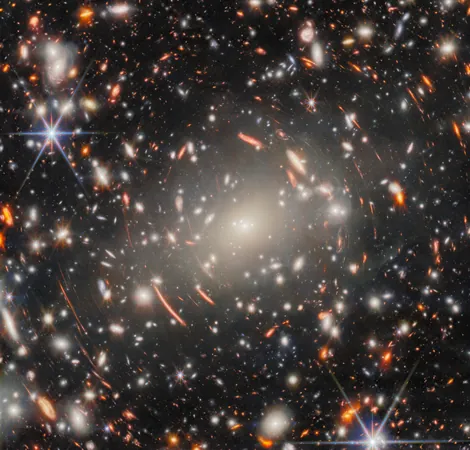
Astronaut Nutrition: The Hidden Barrier to Mars Missions You Didn't Know About!
2024-10-28
Author: William
The Importance of Nutrition in Space Missions
As ambitious plans for a crewed mission to Mars loom on the horizon, one critical aspect remains under-discussed: astronaut nutrition. While astronauts have successfully spent extended periods on the International Space Station (ISS), missions to Mars could stretch for years, significantly complicating the challenges of maintaining nutritional health in space—especially since resupply opportunities will be nonexistent.
Health Risks During Long-Duration Spaceflights
In the microgravity environment of space, astronauts continually battle physiological risks such as muscle degradation and bone density loss, alongside the threat of harmful radiation, which could lead to chronic health issues like cancer. A trip to Mars could take over six months each way, with potential stays of up to 500 days on the Martian surface—far exceeding the mere eight days experienced by the Apollo 11 crew. This extensive duration poses unprecedented health risks, making nutrition supervision vital for mission success.
Current Research on Astronaut Nutrition
NASA is actively investigating the pivotal role nutrition plays for astronauts embarking on long voyages, culminating in recent research published in the comprehensive book, "Human Adaptation to Spaceflight: The Role of Food and Nutrition—2nd Edition." Leading experts in nutrition, biochemistry, biomedical research, and space food systems penned the work, underscoring the historical significance of nutrition on exploration journeys—be it at sea or in uncharted terrain. Interestingly, unlike historical expeditions, astronauts won’t find food en route, demanding robust nutritional planning.
Comparisons to Isolated Environments
The book reveals that understanding the specific dietary needs and food systems for deep space travel is as crucial to maintaining astronaut health as the spacecraft's mechanical integrity. It draws parallels with studies involving isolated environments, such as Antarctic research stations, where limited sunlight and restricted food supplies reflect the conditions astronauts might face.
Lesser-Known Health Risks
In addition to well-known health risks like radiation exposure and musculoskeletal issues, astronauts also confront lesser-known dangers such as neuro-ocular syndrome, weakened immune responses, and alterations in gut microbiota—all of which relate back to nutrition. While the science surrounding these impacts is still evolving, there is considerable evidence pointing toward nutrition's critical influence on astronauts' overall health.
Current Nutritional Practices on the ISS
Currently, astronauts aboard the ISS receive about 10% to 20% of their diet through individual menu selections, along with some fresh produce sent on resupply missions. While this system has diversified their food options, astronauts express a consistent desire for more variety, particularly fresh foods, emphasizing the stark contrast to the nutritional accessibility common on Earth.
Challenges of Food Growth in Space
On terra firma, meeting nutritional needs is as simple as accessing a local grocery store. In space, however, options are limited. Although there have been experimental efforts to cultivate plants like lettuce and kale aboard the ISS, growing enough food to support astronauts on a Mars mission presents an entirely different challenge due to space and payload constraints.
The Role of Dietary Supplements
A pressing question arises: can dietary supplements adequately replace whole foods? According to the authors of the nutritional study, the answer is a resounding no. Studies have indicated the unique benefits of whole foods cannot be replicated through supplementation, and in some cases, such as with certain antioxidants, supplements can exacerbate health risks.
Psychological Aspects of Nutrition
Beyond physical well-being, the psychological aspects of nutrition cannot be overlooked. Access to a variety of healthy foods is crucial for maintaining morale. Sharing meals can enhance crew bonds, fostering a cohesive team atmosphere essential for long-duration missions. Think about the joy of sharing a home-cooked meal—this psychological benefit is equally important in aiding astronauts during their arduous journeys.
The Need for a Comprehensive Food System
Yet, the reality is stark. No comprehensive food system currently exists to meet the nutritional, safety, and resource challenges posed by extended missions, particularly to Mars. The researchers argue that developing a robust space food system is critical—without it, we risk the health of our astronauts and, ultimately, the success of the missions themselves. They assert, 'A space food system designed to fulfill all nutritional requirements must be a core component of every human mission to combat health challenges.'
Conclusion: The Future of Astronaut Nutrition
As we move closer to realizing human exploration of Mars, addressing the complexities of astronaut nutrition might just be the key to unlocking the potential of long-duration spaceflight. Without proper fueling, can we truly expect our astronauts to thrive among the stars? Only time will tell if we can break through this nutritional barrier.









 Brasil (PT)
Brasil (PT)
 Canada (EN)
Canada (EN)
 Chile (ES)
Chile (ES)
 Česko (CS)
Česko (CS)
 대한민국 (KO)
대한민국 (KO)
 España (ES)
España (ES)
 France (FR)
France (FR)
 Hong Kong (EN)
Hong Kong (EN)
 Italia (IT)
Italia (IT)
 日本 (JA)
日本 (JA)
 Magyarország (HU)
Magyarország (HU)
 Norge (NO)
Norge (NO)
 Polska (PL)
Polska (PL)
 Schweiz (DE)
Schweiz (DE)
 Singapore (EN)
Singapore (EN)
 Sverige (SV)
Sverige (SV)
 Suomi (FI)
Suomi (FI)
 Türkiye (TR)
Türkiye (TR)
 الإمارات العربية المتحدة (AR)
الإمارات العربية المتحدة (AR)